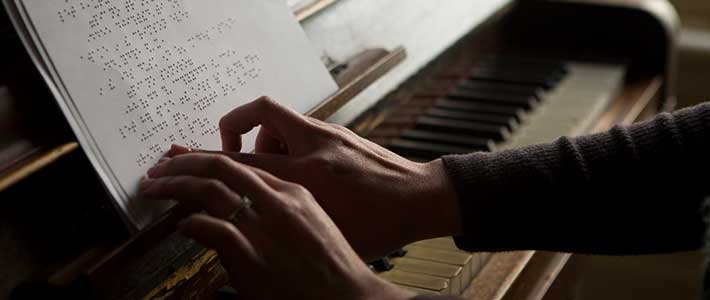
AYO Alumni Stories: Roma Dix – National Braille Music Camp
Roma Dix introduces us to the joy of braille music as she gears up for the National Braille Music Camp of 2019.

Each year blind music students across Australia and New Zealand have the chance to attend a range of inclusive musical programs in the Southern Highlands of NSW. As the co-founder, co-director and coordinator of the camp, Roma Dix has a legacy within the camp of more than 30 years teaching performing arts for the visually impaired.
Roma and her late husband, Ian Cooper, both played in AYO National Music Camps for many years, performed in the Australian Youth Orchestra, and assisted in various ways for the programs. Their inspiration for starting the camp was hearing of the national integration of young blind people into normal and unspecialised school systems – which essentially left out learning music altogether.
Roma says she thought this was appalling and wondered what they were going to do.
“Because of the 20 years I’d spent at AYO’s Music Camps, I just said we’ll run a music camp.”
As simple as that, the camps began in the next school holidays, with Roma’s blind and sighted colleagues and friends all helping to start what would be a long-running initiative for young blind Australians.
The camp is set up to expose blind students to a widespread selection of braille music, experienced teachings and networks of similar individuals; which essentially assists them in becoming more independent people. Participants are aged 9–18, and come from all over the country. They are accompanied by 10 or more staff running the camp, with both visually impaired teachers and non-blind helpers on site.
Having blind tutors, Roma says, is inspiring to kids participating in the camp, knowing they are in the same position.
“The very first camp, we sat the kids down, gave them all a piece of braille music, and Ian started teaching them to sing. Then we did a ‘let’s get to know you’, so they went around the room and Ian told them he was from the Royal Victorian Institute for the Blind (RVIB). All the kids sat up and their jaws dropped, they couldn’t believe he was blind.
So that’s what we’ve always done, that way the kids see you can be blind, you can teach and you can be in a position of authority.”
Each night the camp plays host to performances from the junior and senior choirs, the orchestra and the band, where anyone from the camp can play or sing their piece.
“Right from the beginning, the camp has been run by the blind. We’ve been going so long that we’ve got campers who’ve loved camp, grown up to become good musicians, they’ve kept coming and now they run the camp for us, which is fabulous.”
After a 50-year career, Roma Dix is still organising orchestras and running concert bands after retiring from music teaching at Fresham All-Girls School.
At its core, NBMC is wholeheartedly set up as a way for kids to feel included and have the same opportunities as other peers their age.
“The kids love it!” says Roma. “They’re usually integrated in a school, and they’re just one or two funny or odd kids in a school, and they’re different to all the others. All the other kids are reading books and going out to play sport. They find it difficult to make friends, they can be lonely, isolated kids, but then they come to camp and suddenly they’re normal – everybody’s blind, nobody makes a fuss and they’re all treated the same.”
When we asked Roma the highlights of these camps and what inspires her each year, she said it would have to be the Friday concert they put together for the best performances at the end of each camp.
“It’s just wonderful, what they do, performing what they’ve been doing for the week. They’re happy, they know each other, they know their place and they just walk in and find their own seats. You just look and you say – it’s fantastic.”